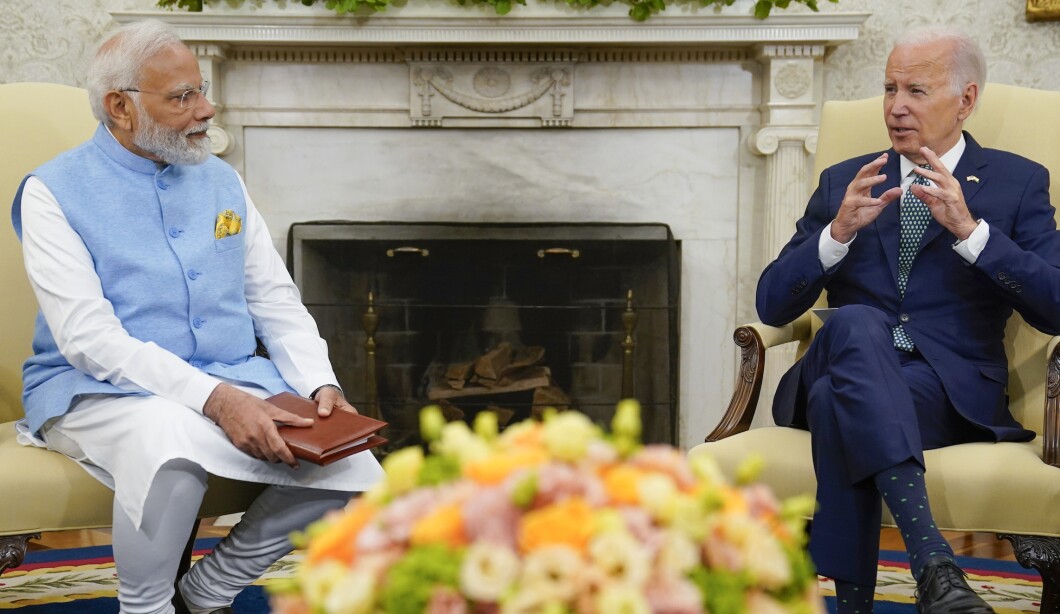
President Joe Biden’s interest in limited cooperation with China could be overtaken by domestic politics and his own ideological distaste for the communist regime, according to former officials and analysts.
“The last thing he’s going to do, heading into elections next year, is allow the Republicans to claim he’s soft on China,” a former senior intelligence official told the Washington Examiner. “The last thing they ask themselves before he makes a decision on China is how will this play domestically? What will the cable news networks and the media do with it? And if it’s not a good answer, he won’t do it.”
BIDEN MANAGES TENSE RELATIONS WITH CHINA
That dynamic came to the fore in recent days as Secretary of State Antony Blinken traveled to Beijing in the hope of establishing a dialogue to “manage responsibly” the intensifying U.S.-China competition. In parallel, Biden hit the campaign trail for a fundraiser in which he referred to Chinese General Secretary Xi Jinping as a “dictator” and then returned to Washington to host Indian Prime Minister Narendra Modi on a state visit, despite widespread criticism that Modi’s ruling party discriminates against religious minorities.
“Fundamentally, the two sides have different views about the trajectory and the rules of the relationship,” Center for Strategic and International Studies senior fellow Lily McElwee told the Washington Examiner. “So the Chinese think that in order to have a stable relationship, we need certain concessions from the U.S. side and show China a certain respect in some ways.”
That’s not an attractive option for any political leader, particularly given the American perception that “Xi is making plans to give him the option of using military force to overtake the island of Taiwan,” as a prominent Democratic senator noted this week.
“Pay attention to the number of times China is mentioned in political campaign commercials when it comes election time; that is reflective of an American public that cares about China,” Sen. Chris Murphy (D-CT), who sits on the Foreign Relations Committee, said Wednesday during a Foreign Policy magazine event. “Now, it may be more interested in the role that China has played in this new global economic order in which we don’t feel like Americans have been treated very well. But it also means that America is paying attention to China’s other malevolent behaviors.”
Biden offered a frank account of the basis for U.S. “respect” for other governments. “One of the fundamental reasons that I believe the U.S.-China relationship is not in [the same space] as the U.S.-India relationship is that there’s an overwhelming respect for each other because we’re both democracies,” Biden told reporters during a Thursday press conference with Modi. “It is in America’s DNA and, I believe, India’s DNA. … The whole world has a stake in our success, both of us. And maintaining our democracies makes us appealing partners and enables us to expand democratic institutions around the world.”

U.S. and European officials have made a habit of framing Western relations with China in modulated terms. European Union leaders have described China as “a partner for cooperation and negotiation, an economic competitor and a systemic rival,” and the Biden administration likewise has held out the hope of partnering with China on some priorities.
“There is nothing inconsistent with competing vigorously and talking with [China] on a range of issues,” the White House National Security Council’s lead official for the Indo-Pacific, Kurt Campbell, told reporters as Blinken prepared to depart for Beijing last week. “We can’t let the disagreements that might divide us stand in the way of moving forward on the global priorities that require us all to work together.”
Climate change has loomed as perhaps the top priority for Western policymakers desirous of cooperation with China. And though Biden referred to climate change as “the most serious problem we face as human beings,” his recent remarks about Xi suggest that this priority is taking a back seat to the geopolitical rivalry.
“Back in the Obama administration, the U.S. was really concerned about securing China’s cooperation on climate change … Right now, that competitive element is driving the relationship,” McElwee said. “If we look at the actions that the Biden administration has taken, it’s certainly been along the lines of [saying], ‘We’re in an adversarial relationship with China; we need to take actions to protect national security, economic security, to slow China’s military development.”
Biden brushed off the idea that his jab at Xi “had any real consequence,” but it tends to reinforce Chinese Communist claims that the United States is presenting a “fake illusion” of a desire for dialogue with China.
“Biden’s statement seems to personally go after Xi Jinping, which I think is going to be read in Beijing as a real insult after Xi hosted Blinken, so I do think this is a problem,” the American Enterprise Institute’s Zack Cooper said of the “dictator” comment. “I do think the administration is going to end up scrambling to try and explain this, and it puts them on the back foot.”
The remarks drew a furious response from the Chinese diplomats, who said Biden’s fundraiser comments “seriously violate basic facts, diplomatic protocol, and China’s political dignity” and summoned U.S. Ambassador Bill Burns for a personal rebuke.
“Closer to the election season, it is clear that the Biden administration is appeasing domestic voters and, to them, the current and immediate threat is China and its growing global influence,” Tsinghua University research fellow Zoon Ahmed Khan told the South China Morning Post. “In practical terms, for the Biden administration to make it clear that they are willing to engage China is important for optics, but equally they have to show themselves in front of their allies as the leader of the ‘free world.’”
The intensification of the competition between the United States and China adds significance to the options of those other governments and societies. As Biden hosted Modi, Chinese Premier Li Keqiang made stops in Paris and Berlin, where he urged European governments to reject U.S. calls to “de-risk” their economic relations with China.
The struggle for influence among other countries incentivizes both sides to showcase their willingness to continue at least some forms of diplomatic dialogue, analysts say.
CLICK HERE TO READ MORE FROM THE WASHINGTON EXAMINER
“So he’s going to cover his right flank by talking episodically about China, but then, you know, he gets back into the system, and they’re telling him, ‘You have goals, and for us to achieve these goals, we need to at least have dialogue,’” the former senior intelligence officer said.
McElwee offered a similar assessment of the Chinese posture. “We’re in an environment right now where comments can temporarily derail a desire to engender more stability in the relationship, but I think the key word there is ‘temporarily,’” the CSIS scholar said. “China is essentially feeling the pressure, as well, to show a certain degree of goodwill — to not make it seem like it is the irresponsible party in this situation.”






